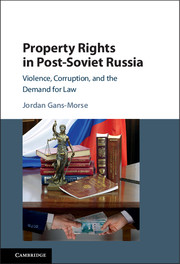Book contents
- Frontmatter
- Contents
- List of Tables
- List of Figures
- Acknowledgments
- 1 Violence, Corruption, and Demand for Law
- 2 Institutional Supply and Demand
- 3 The Evolution of FirmStrategies
- 4 The Role of State Legal Capacity
- 5 Demand-Side Barriers to the Use of Legal Strategies
- 6 The Effectiveness of Illegal Strategies
- 7 Variation in Strategies across Firms
- 8 Firms, States, and the Rule of Law in Comparative Perspective
- Appendices
- References
- Index
2 - Institutional Supply and Demand
Published online by Cambridge University Press: 13 July 2017
- Frontmatter
- Contents
- List of Tables
- List of Figures
- Acknowledgments
- 1 Violence, Corruption, and Demand for Law
- 2 Institutional Supply and Demand
- 3 The Evolution of FirmStrategies
- 4 The Role of State Legal Capacity
- 5 Demand-Side Barriers to the Use of Legal Strategies
- 6 The Effectiveness of Illegal Strategies
- 7 Variation in Strategies across Firms
- 8 Firms, States, and the Rule of Law in Comparative Perspective
- Appendices
- References
- Index
Summary
When do firms use violence and corruption, such as mafia protection rackets and illicit government connections, to secure property rights? And when do firms instead turn to formal state legal institutions, such as courts and law enforcement agencies? As discussed in the introductory chapter, firms’ reliance on violence and corruption undermines and destabilizes formal legal institutions. Firms’ utilization of courts and law enforcement, on the other hand, reinforces formal institutions’ effectiveness and relevance. Consequently, the strategies firms use to secure property have important ramifications for the rule of law and, even more broadly, for the state-building prospects of societies seeking to develop effective formal state institutions.
This book offers a theory of institutional demand that offers insights into firm strategies, as well as an analytical framework that integrates the demand and supply sides of property security. To develop this framework, the current chapter first introduces a typology of different types of property security strategies employed by firms. The chapter then examines how three key factors affect firms’ choice of property security strategies. Existing studies of property rights focus predominantly on the first factor – state legal capacity – and suggest that the supply of effective formal legal institutions is the primary determinant of firmstrategies. By contrast, the framework advanced here demonstrates that while the absence of state legal capacity impedes firms’ use of law, improved capacity frequently does not provide incentives for firms to alter their strategies for securing property. Put differently, institutional supply does not automatically induce institutional demand. Instead, a central argument of this book is that two factors unrelated to state legal capacity often determine the extent to which firms utilize violence and corruption rather than turning to law: the prevalence of demand-side barriers to using formal legal institutions and the effectiveness of illegal strategies for securing property.
After presenting the framework, the chapter provides a preliminary illustration of the theory in the context of post-Soviet Russia. In particular, the Russian experience in the 1990s demonstrates that the development of formal legal institutions does not ensure firms’ use of law, particularly when demand-side barriers remain prevalent and illegal strategies remain effective. Meanwhile, the Russian case in the 2000s demonstrates that even without heightened state legal capacity, firms may increase their use of formal legal institutions as demand-side barriers fall or the effectiveness of illegal strategies declines.
- Type
- Chapter
- Information
- Property Rights in Post-Soviet RussiaViolence, Corruption, and the Demand for Law, pp. 16 - 42Publisher: Cambridge University PressPrint publication year: 2017



